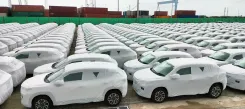South Korea Launches Domestic Production of Nanotech-Enhanced Chip Filters

Seoul, Dec 17 (NationPress) The ministry of industry in South Korea declared on Tuesday that the nation has initiated its inaugural domestic production of filters employing nanotechnology, which opens avenues for the self-sufficiency of a vital product essential for semiconductor fabrication.
The manufacturing process has commenced at the Synopex Inc. facility located in Dongtan, approximately 40 kilometers south of Seoul, with the output capacity deemed adequate to satisfy the entire domestic demand, as stated by the Ministry of Trade, Industry and Energy.
Historically, South Korea has depended exclusively on imports for this material, with an annual requirement estimated at 8,000 units or 100 billion won (around $69.5 million), according to the ministry, as reported by the YOnhap news agency.
The government has allocated 12.3 billion won for this initiative, aligning with efforts to expedite research projects aimed at bolstering materials, parts, and equipment industries, while also stabilizing supply chains.
The filters produced by Synopex are set to be utilized in chip manufacturing by major players like Samsung Electronics Co. and SK hynix Inc., the ministry added.
"The government is committed to continuing investments in research and development projects for advanced industries to ensure a reliable supply chain," stated Industry Policy Deputy Minister Lee Seung-ryeol.
In a related note, South Korea's semiconductor exports are facing increasing challenges from China, Taiwan, and Malaysia due to escalating global competition in sophisticated sectors.
A report from the Korea Trade-Investment Promotion Agency, known as KOTRA, highlighted that China is South Korea's primary competitor in the semiconductor market, with an export similarity index (ESI) score of 72.2 in the third quarter of this year.
The ESI for Taiwan has also shown significant growth, increasing by 7.6 points over four years to reach 32.5, marking the most substantial growth among leading semiconductor exporters.
Additionally, Malaysia's ESI rose by 6 points to 50.5 during the same timeframe, representing the second-highest growth trailing Taiwan.
KOTRA pointed out that Malaysia has become a formidable competitor, ranking fifth globally in semiconductor exports and managing 13 percent of the worldwide semiconductor assembly, testing, and packaging operations.








